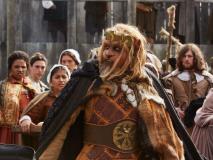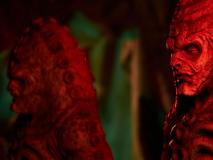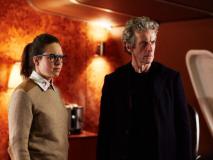Barry Newbery 1927-2015
Wednesday, 25 February 2015 - Reported by Marcus
 Veteran Doctor Who designer Barry Newbery has died at the age of 88.
Veteran Doctor Who designer Barry Newbery has died at the age of 88. Barry Newbery was one of the most prolific designers of Doctor Who, working on more episodes of the classic series than any other designer in its 26 year history. His contribution ranged from the very first story An Unearthly Child in 1963 through to The Awakening in 1984, a total of 62 episodes across 14 stories.
Barry Newbery joined the BBC in the late 1950's after working as a freelance designer in London, overseeing window displays and designing exhibitions. Early work for the Corporation included Comedy Playhouse and The Last Man Out, a 1962 period drama starring Barry Letts.
In 1963 he found himself attached to the new science fiction programme, planned by the BBC, Doctor Who. He was one of two designers drafted in to replace original designer Peter Brachacki, who had left the series following disagreements with the series producer Verity Lambert. Brachacki had designed the sets for the original pilot, but had left the show by the time the first episode was reshot, leaving Newbery to recreate the original Junkyard and School set, which had been destroyed following completion of the pilot.
For the majority of Doctor Who's first two years Newbery would share the design work with Raymond Cusick, with Cusick taking the Science fiction stories, while Newbery worked on the historical adventures. After creating a stone age settlement for An Unearthly Child, he was tasked with creating the court of Kubla Khan in Marco Polo, the city of Tenochtitlan in The Aztecs, the cities and deserts around Jaffa in The Crusade and Saxon England in The Time Meddler
In 1965 he worked on the first Doctor Who Christmas episode, The Feast of Steven, before completing the remaining 5 episodes of the The Daleks' Master Plan. He voyged into the future with The Ark before returning to the historicals, recreating the town of Tombstone, Arizona in the story The Gunfighters.
In 1968 he worked on his one Second Doctor story, The Dominators and in 1970 his one Third Doctor story The Silurians. He completed three Fourth Doctor stories, The Brain of Morbius and The Masque of Mandragora in 1976, followed by The Invisible Enemy in 1977.
His final credit for Doctor Who came in 1984 when he designed the Fifth Doctor story The Awakening.
Outside of Doctor Who Newbery worked on vast range of projects, being involved in some of the most iconic television series of the time. He wroked on historical dramas including The Onedin Line, Prince Regent, The Citadel and The Shadow of the Tower as well as more modern dramas such as Z Cars, Softly Softly and The Expert. He ventured into comedy with shows such as Dad’s Army and Sykes.
In 1979 Newbery won an RTS Television Award for his work on The Lost Boys and the following year he received a BAFTA nomination for Prince Regent.
Newbery took a great many behind-the-scenes photographs during his time on Doctor Who and a large selection were published in The Barry Newbery Signature Collection, published by Telos Publishing Ltd. in 2013.
Barry Newbery died peacefully in his sleep Wednesday morning.























